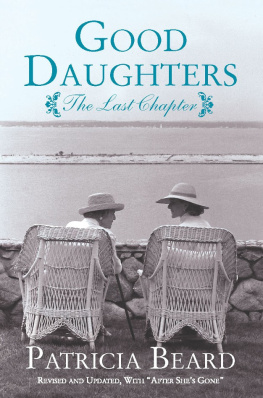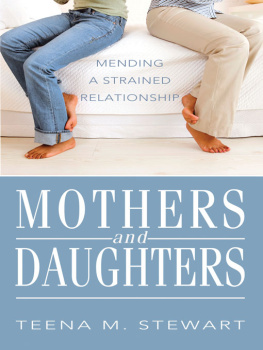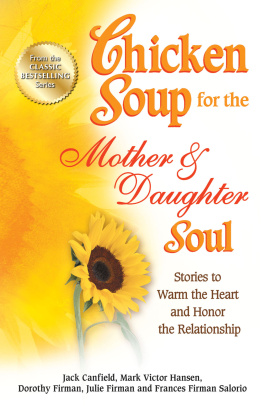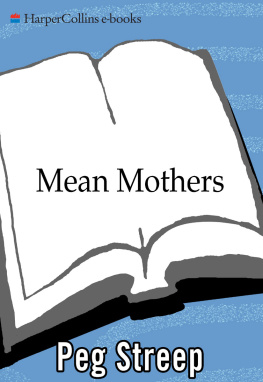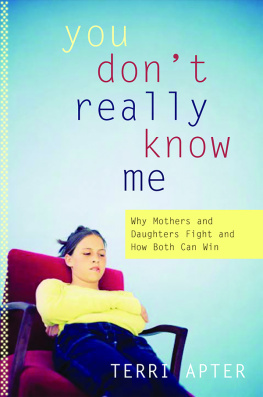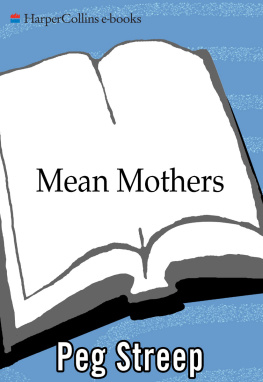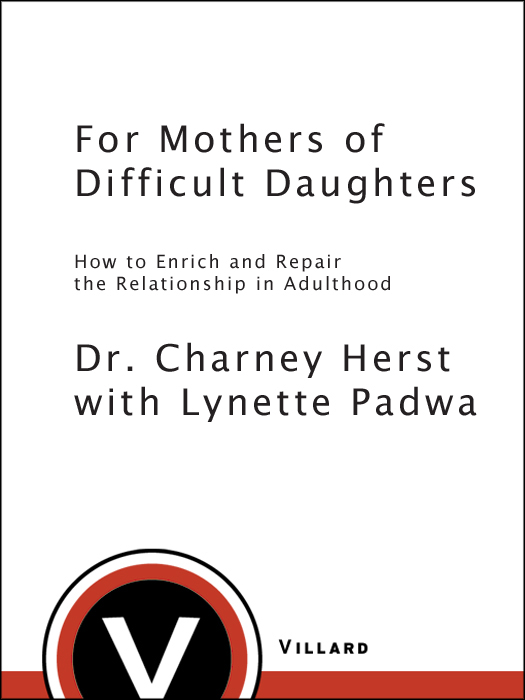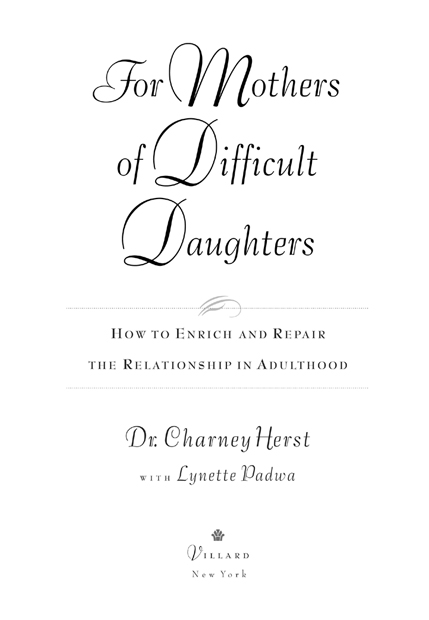A UTHORS N OTE
The examples and anecdotes in this book are based on real people and incidents. However, all names, ages, physical attributes, and other identifying features have been changed to protect the privacy of the participants.
Copyright 1998, 1999 by Irene Herst
All rights reserved under International and Pan-American Copyright Conventions. Published in the United States by Villard Books, a division of Random House, Inc., New York, and simultaneously in Canada by Random House of Canada Limited, Toronto.
V ILLARD B OOKS and colophon are registered trademarks of Random House, Inc.
This book was originally published in hardcover by Villard Books, a division of Random House, Inc., in 1998
Library of Congress Cataloging-in-Publication Data
Herst, Charney.
For mothers of difficult daughters: how to enrich and repair the relationship in adulthood/Charney Herst, with Lynette Padwa.
p. cm.
eISBN: 978-0-307-80453-2
1. Parent and adult child. 2. Mothers and daughters. I. Padwa, Lynette.
HQ755.86.H47 1998
306.874dc21 97-37268
Random House website address: www.atrandom.com
v3.1

I N M EMORY OF MY
WONDERFUL M OTHER ,
S YLVIA M ADRAZO .
C . H .
T O MY PARENTS ,
L IBBY AND N ED P ADWA ,
WITH LOVE AND GRATITUDE .
L . P .
A CKNOWLEDGMENTS
I wish to express my gratitude to my parents, Sylvia and Angel Madrazo. They taught me the principles of sound family life, and I have endeavored to follow the model they provided me. They inculcated within me their European values of dignity and respect along with unconditional love, nurturance, and acceptance. I passed these fundamentals of family on to my children.
I am grateful to my husband, Simon, for his patience, understanding, support, and excellent spelling ability. He is my best friend and president of my fan club.
To my big brother, David Louis Madrazo, thank you for parenting me when I needed it. To my little sister, Paula Rudy, thank you for allowing me to parent you. We developed these skills at an early age. Along with my half brothers Larry and Murray Gray, and Grandma Ethel Lubinsky, we comprised a big, healthy, spirited, cooperative family.
To my children, thank you for helping me to become the person I am today. From you I learned patience and tolerance for almost everything, never letting go of our family love and all of its benefits. My best education came from you five. We are a living textbook. My family: Robin Stevens, David Herst, Rick Herst, Barbara Einseidl, and Helene Bixler. Their mates respectively: John Brammel, Andrea Paparides, Susan Herst, Richard Einseidl, and Larry Bixler. I am grateful for my stepchildren: Robert Buchsbaum and his wife, Dona, and Jeffrey Buchsbaum and his mate, Richard Ginzel. Thank you for the grandchildren you have contributed to the family: Rebecca Goodman, Douglas Yonkich, Rick Jr. and Linzy Herst; William, Daniel, and Ashley Bixler; and Jennifer Buchsbaum, our latest addition.
Thanks to Dr. Phoebe Frank, my dearest friend, for her inspiration. She served as a good example, having already been published. To Dr. Barbara Griffith, who so professionally edited the books technical aspects, I am grateful. To Dr. Martin Bravin, my mentor and friend and colleague, thank you for always believing in me. To my readers, Shellie and Len Liebson and Helen and Al Dennis, thank you for valuable feedback. To Joan Kossowsky, my very first friend from my hometown, Perth Amboy, N.J., I am grateful for our lifelong friendship. Our mothers were friends and they brought us together when we were five. To my girlfriends Lil Bleifer and Paquita Pierpont, I am still delighted with your mother stories.
To the ladies who read: Thank you for your valuable mother-daughter stories. Every thought you shared helped my process in this book. Monday book club members: Millie Polisky, Charlotte Rothman, Mickey Keyser, Myrna Eiduson, Bertie Massoth, Chickie Abel, and Marion Cohen. Thursday book club members: Phoebe Frank, Audrey Buchsbaum, Harriet Oppenheim, Barbara Swedelson, Bobbie Klubeck, Lois Treiser, and Allegreta Blau.
To my adopted family, I am grateful to all of you for your support and enthusiasm: Allen and Marcia Turner, Lee Lupoff, Rita Borne, Barbara and Al Swedelson, Harriet amd Irwin Oppenheim, Lori and Arthur Stelzer, Rabbi Jerry, and Mickey Fisher.
I wish to express my heartfelt appreciation to Leslie Berger of the Los Angeles Times. Leslie wrote an article about the clinical work I do in my practice with groups and private clients having mother-daughter problems. Suzanne Wickham-Beaird of Random House, editor of this book, was one of the many people who read that article. Suzanne has since become my patron, adviser, my support system, and my guide into the literary world. An exemplary person, Suzanne in her warm, comforting way managed to shelter me while at the same time professionally and skillfully moving me through the maze of publication. I am proud to know her.
Betsy Amster, agent supreme, handles the myriad details of the huge undertaking called the book. This is a complicated process to learn and Betsy was always there to act as guide and cheerleader. Thank you, Betsy.
My writer, collaborator, colleague, friend, and surrogate daughter, Lynette Padwa, is very important to me. Not only did we become a writing team, we also became very close in our relationship. It is so comforting to know that your working partner is someone you love, trust, and respect. She is an excellent writer, and I would have been lost and overwhelmed without her. I hope she will always be in my life.
Finally I want to express my appreciation to the 150 or more mothers and daughters I have spoken to about their relationships. They are the heroines, since it is their lives and stories that make up the substance of this volume. Thank you all for your cooperation and openness. You will not recognize yourselves since all identifying features have been changed; just remember that each of you has contributed greatly to this book.
D R C HARNEY H ERST
C ONTENTS
I NTRODUCTION
We stood in the courtroom, my teenage daughter and I, staring up at the judge seated on his bench high above us. The year was 1970 and my daughter was the reason we were thereunbeknownst to me, she had planted marijuana in my rose garden. A neighbor child had stolen a plant and taken it home, where his mother promptly discovered it and reported us to the police. Our whole family was charged with possession of an illegal drug. After hearing my testimony, the judge peered over at me reproachfully and ordered, Mother, get your act together.
Me? I blurted out. She planted it! Stung and humiliated, I was furious at the judge for his unfair assumptions. But I should have thanked him, for in that moment a mothers advocate was born.
At the time the judge issued his sage advice, I was the mother of five teenagers. I was a Boy Scout troop mother, carpool driver, housekeeper for a ten-room house, breeder of collies, and I held a straight-A average in the college courses I was taking during the day when my kids were in school. My act was together. It was my daughters actions that were the problem. Yet I was admonished and publicly embarrassed, especially after the local newspaper ran the storycomplete with a photo of my rose garden.


